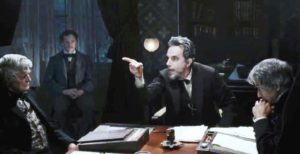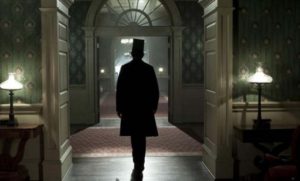Lincoln – (IMMEDIATE REACTION: And what if last week’s election had gone the other way? Would that 13th Amendment have been repealed? Oops. Spoiler…Sorry about that, those-of-you-who-slept-through-high-school-history….)
Race prowls, growls and snaps along the edges of Steven Spielberg’s Lincoln as it never could throughout the recent political campaign. And to briefly digress, the evasions have only gotten worse since last Tuesday. So far, no one in what Sarah Palin and I love to label the “lame-stream media” wishes to acknowledge the specter of racism in these calls for secession by spoilsports in Texas and elsewhere. I’d like to believe, as Lincoln widens its presence in the Great American Multiplex, that the neo-Victorian lummoxes now wasting their energies on the Petraeus-Broadhurst Misadventures will be compelled by the movie to see this neo-Confederate furor as the maypole-dance-for-bigotry that it is. But as a good friend of mine sadly reflected today, it would have been nice to think that last week’s election results meant we’d finally put away all our childish things.
As vital as I think Lincoln is to generating a more perfect discourse on race and union, I think the movie’s gradual release better facilitates such maturity. A more big-footed nationwide bust-out of any Spielberg movie conditions audiences to expect pyrotechnics and razzle-dazzle, if not dinosaurs and aliens. This is a deliberately-paced, serious-but-not-altogether-solemn epic that needs all of its 150 minutes to convey the urgency, languor and ultimate viability of the democratic process. If Steven Spielberg’s showmanship can’t make compelling cinema from material as multi-layered as Doris Kearns Goodwin’s Team of Rivals, nothing can. It can, and does.
(And, for the record, boys and girls, there are plenty of dinosaurs and exotic beings in this one as well, if only metaphorical ones. You’ll see what I mean.)
As with Amazing Grace, Michael Apted’s handsome, relatively neglected 2006 movie about Britain’s abolition of slavery, Spielberg’s Lincoln isn’t about African American rights so much as it is about politics itself, and how time, personality, and the velvet-fisted power of persuasion can converge to bring about epochal, seemingly miraculous transformation. Abraham Lincoln’s efforts to pass the 13th Amendment abolishing slavery (little noted and not as long remembered as the Emancipation Proclamation) provides a surprisingly wide lens for viewing the contradictions and complexities of both the Republic and its haggard-but-dauntless leader in the final months of its greatest crisis. Among the many small miracles wrought by Tony Kushner’s script (and the movie is as much Kushner’s as it is Spielberg’s, maybe more) is its seamless compression of the personal travails of its protagonist with the brilliant calculation of his maneuvering. You’d have to know going into the theater that, however much the movie is packaged as civic education, you’re not going to visit a stone edifice. You’d also have to know that Daniel Day-Lewis, whose preparation is so diligent and fertile that it can sometimes spill onto the scene, nails down everything there can possibly be about Lincoln’s voice and physical movement, even the way he nestles against his sleeping youngest boy, to leave little or no doubt that this is how “our one true genius in politics” (vide Robert Lowell) really behaved in sorrow, anger and, most tellingly, in jest. (Would it really ruin things for you if I disclosed that Lincoln tells a dirty joke in the movie? Or would it make you more curious? Either way, I’m not sorry. At least I didn’t tell the joke.)
As good as Day-Lewis is, it’s not as dominant a performance as you might expect — or dread. Tommy Lee Jones, that proud son of the once-and-future Republic of Texas, dines robustly on scenery as the Pennsylvania abolitionist congressman Thaddeus Stevens, treated so shabbily by D.W. Griffith in Birth of a Nation and here given some of the better lines not assigned to Lincoln himself. Sally Field’s Mary Todd Lincoln, though nowhere near as edgy as Mary Tyler Moore’s version in the 1988 TV mini-series version of Gore Vidal’s Lincoln, is as persuasively grounded as she is borderline hysterical. Everyone else, from Bruce McGill and David Straithairn as cabinet stalwarts Edwin Stanton and William Seward, respectively, to a near-unrecognizable James Spader as ringleader of Lincoln’s back-ally lobbyists, makes vivid use of on-screen time, even Lee Pace as the flamboyant Copperwood Democrat Fernando Wood who wanted New York to secede and Justified’s peerless Walton Goggins, his wormy magnetism on that show checked here in the role of a tremulous fence-sitting Democrat fiercely tugged by both sides in the amendment debate.
And what about the African Americans? Well, as seems customary in the aforementioned lame-stream, they talk less here than they are talked-about. Gloria Reuben’s Elizabeth Keckley, dressmaker and “confidant” to the First Lady, is permitted here to ask Lincoln the question most black people are more likely to ask of him now: How, Mr. President, do you really feel about us? Mr. President finesses the answer in the movie with precisely the same ambiguity with which he dealt with the race question all his life. (He was never as ambiguous on slavery itself. The distinction isn’t as clear here as it perhaps should be, but it’s there.) David Oyewelo, as one of the black Union soldiers speaking directly with Lincoln at the movie’s beginning, is far less credulous, peering at the president’s amiable façade with visible skepticism over its owner’s commitment to that “new Birth of Freedom” cited at Gettysburg months before the movie’s story begins.
But if black people aren’t as conspicuous as whites in Lincoln, race, as noted earlier, rages insistently throughout, stalking the historical figures like a rough, fearsomely mythological beast whose presence drives everyone’s actions, even – especially – the hesitation or outright refusal to act at all. And the movie is not the least bit shy implying that it is hysteria towards the very idea of “race-mixing” rather than the dark race of the despised minority itself that is most complicit in the Civil War’s bloodshed. Nowhere is this made more visually striking than after the unsuccessful attempt by Confederacy vice-president Alexander Stephens (Jackie Earle Haley) and his “commissioners” to retain slavery as a prerequisite for a negotiated settlement between North and South. The impasse fades to the image of a city in flames illuminating the night, followed by a gloomy ride by Lincoln and assorted military officers through a sooty, corpse-riddled battleground in Virginia. At such a point, those familiar with Lincoln’s life and words might be inclined to think of his 1858 speech in Edwardsville, Illinois when he dares to ask whites about dehumanizing and subjugating blacks: “Are you quite sure the demon which you have roused will not turn and rend you?”
I bet Tony Kushner knew that speech. I’m also betting that Kushner, who’s on-record defending Barack Obama’s circumspection and cool resolve against the dismissive criticism from Kushner’s left-wing allies, worked on this screenplay over the past few years with the intuitive sense that the 44th president’s struggles to finesse necessary transformation against ferocious and, at times, irrational opposition mirror those of the 16th president. Such perception gives his script a breadth, passion and level of commitment rivaling those of his stage work, notably, inevitably, Angels in America.
Lincoln, as the film takes pains to point out, is not perfect – and neither is Lincoln. Its ending comes across as Spielberg’s surrender to the temptation of making things obvious to the audience. It needed to end a few minutes earlier. (No, not this time. See for yourself.) Still, though we’re all in dire need of remedial history and (God knows) civics, Lincoln arrives not as a $50 million classroom lecture, but as a deeply enthralling diorama of tragedy and triumph bridged by the worst (avarice, bigotry, meanness of spirit) and best (equanimity, perspective, the enduring power of the open mind) from our many selves. And in case I didn’t make it clear at the outset, I’m as surprised by all this as you are – or will be.



